Board games, miniature war games: How Singapore’s tabletop community keeps offline gaming alive
Over 9,000 gathered at the recent TableCon Quest 2025 in Singapore to play board games, card battles and miniature war games as offline gaming surges.
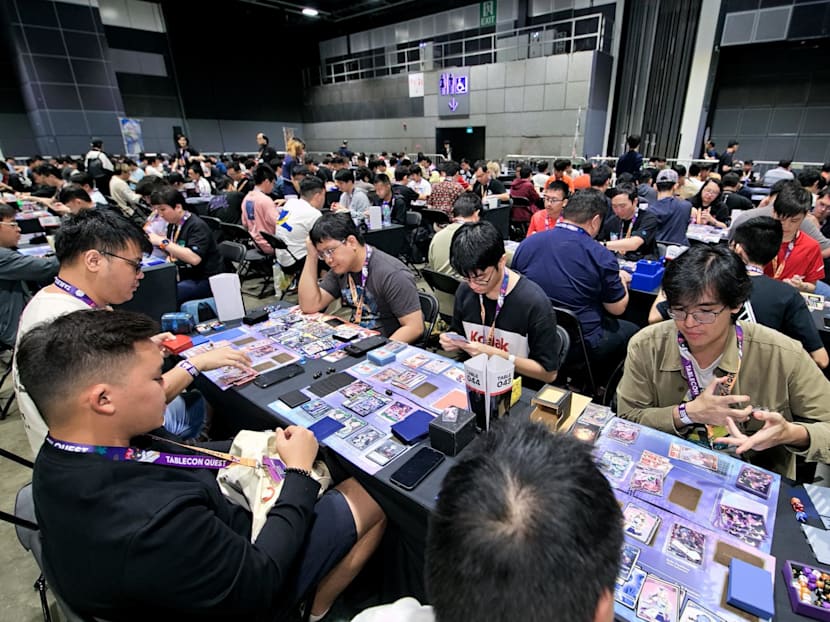
Tabletop gamers congregating at TableCon Quest 2025. (Photo: TableCon Quest 2025)

This audio is generated by an AI tool.
For most people, the word gaming is usually associated with video games played in front of a computer monitor or TV, or even with a phone.
But at the recent TableCon Quest 2025 held in Singapore in August, a modest crowd of over 9,000 attendees gathered to play a diverse genre of games without any of these – from collectible card games and historical board games to even fantasy war games with beautiful painted miniatures played with rulers and dice.
And with US$967.53 million (S$1.24 billion) revenue in Asia alone, the collectible card games market stands out among these. One of the bigger players in the space, Bushiroad (and its many trading card game titles such as Cardfight!! Vanguard), is the one to watch. Taking place at the event were the Bushiroad Expo and Card Game Festival, which featured 2,000 players battling it out for special cards awarded to the top players.
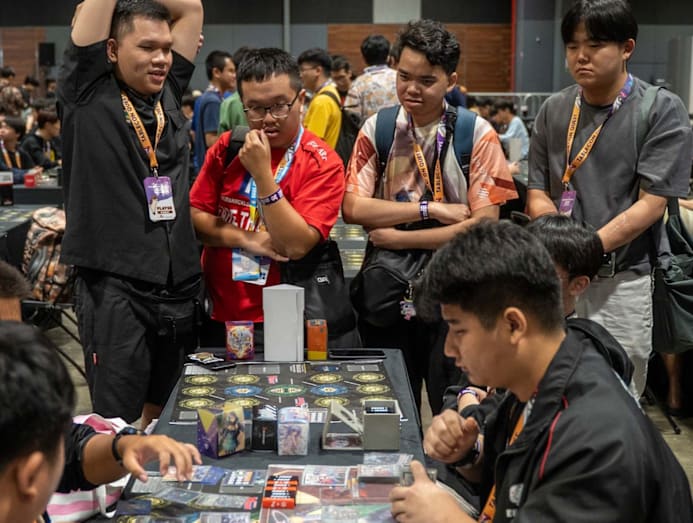
"It is very challenging to launch and sustain a new card game, so I think Bushiroad has established a unique position in the market," said Shunichi Taira, Bushiroad International's CEO and Chairman.
"The card game market has really grown the past few years, and there are more new card games coming into the market, so I expect the trend to continue."
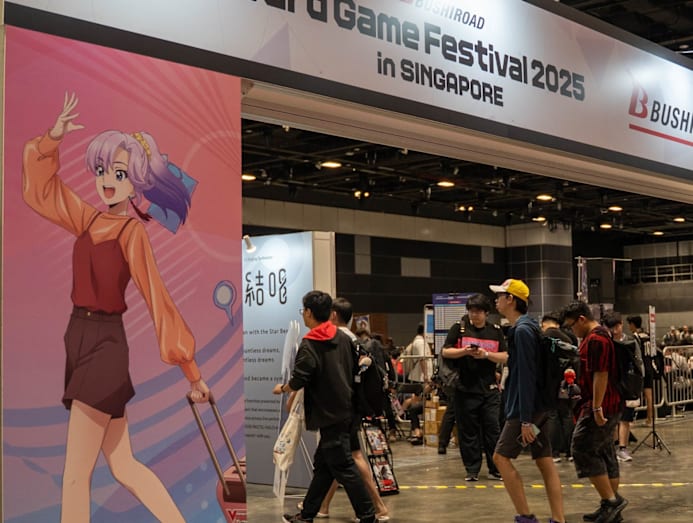
And if you're wondering just how lucrative these collectible card games are, look no further than the Pokemon Trading Card Game, where collectors can easily pay S$4,000 or more for a rare card. One trader, for example, switched from selling sneakers to selling Pokemon cards during the COVID-19 pandemic.
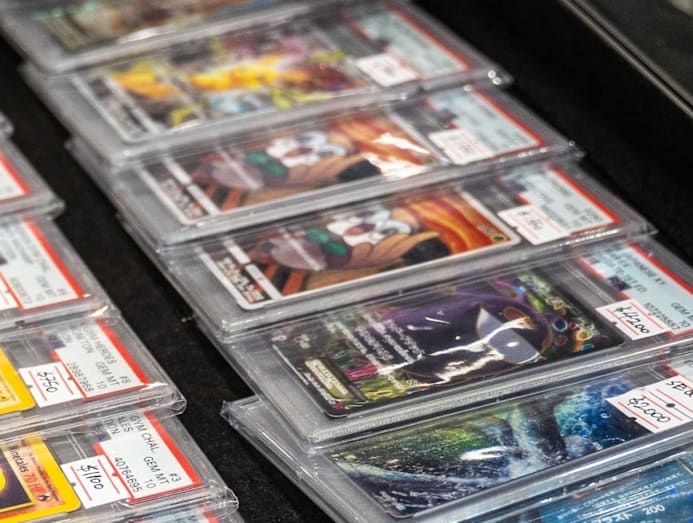
"I feel like in terms of investments, it's a pretty decent way to invest. My own expensive box set is like S$18,000," said Cha Yi, a Singapore Institute of Technology undergrad and Pokemon Trading Card Game trader.
"We buy and trade at percentages, then we sell it out to the general market and at market or slightly below market."
A MATTER OF HISTORY
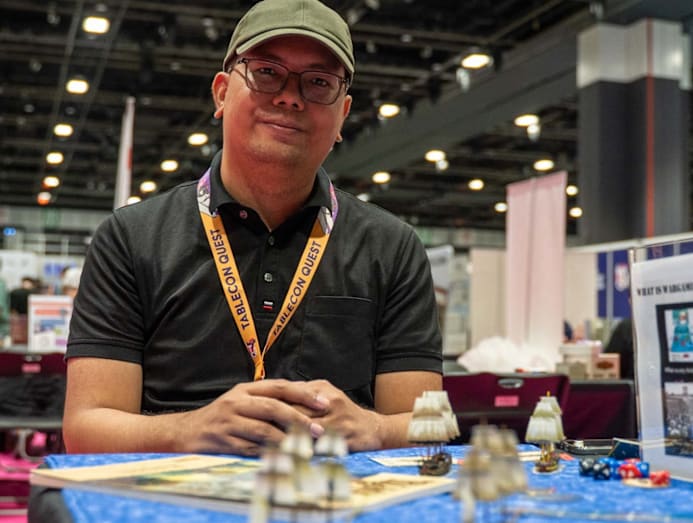
Sitting in front of beautifully painted paper warships at TableCon Quest, 35-year-old historical war gamer Saffarudin Bin Osman is an event organiser for Hex and Counter, Wargames Singapore. The group has around 25 players, and game together at the Ang Mo Kio Public Library on every third Sunday of the month.
"The historical war games community in Singapore is a very small community, because games such as Warhammer 40K are still popular, and we're still small compared to the sci-fiction scene," said Saffarudin.
"Most of the members are on the senior side, and used to play at the Bukit Merah SAFRA, but stopped playing in the early 90s. There's a long 20-year gap where they did not play, but now that they've retired, I talked to them because of my interest in history, and I enjoy playing so we decided to build a community."
As the youngest member in the group – there are a lot of members in their 80s – Saffarudin has been playing for a year now, and finds the atmosphere very relaxing, as the senior players are more relaxed and not as competitive. It also helps that these players already know a lot of games and have a vast collection to share.
And if you're keen on picking up a new hobby, you'd be happy to know that the group also organises monthly sessions with the National Library Board LearnX events, where members of the public can come by and learn how to play for free.
DESIGNING YOUR OWN
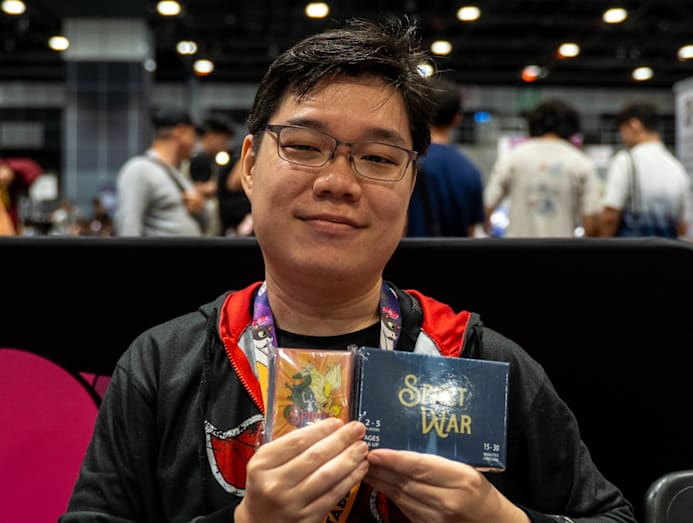
Creating your own game may seem like a daunting task, but 37-year-old Situ Jianle wanted to make something that he and his friends could play casually that was also engaging. His game, Spirit War, is meant for two to five players, and takes about 15 to 30 minutes to play. It's a take on the classic rock, papers, scissors setup, but with support cards to let you change how it plays out.
"We usually gather to play board games sessions, but as we grew older, we found ourselves lacking enough time, so we wanted to create something that's more casual but also engaging," said Situ.
"I came up with the idea one and half years ago, and it was something I randomly came up with, I didn't actually have a direction."
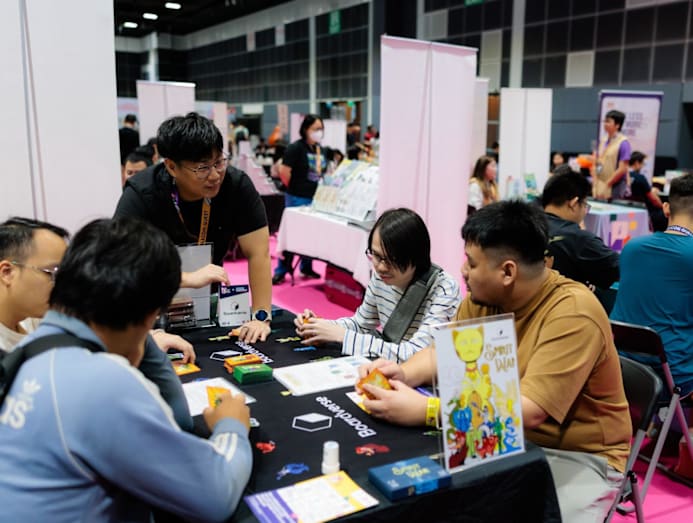
So far, sales for Spirit War have been slow, but Situ admits that he hasn't actually been doing marketing for his game. After all, it's not his full time job – he's an IT project manager – but a passion project that he's really into.
"To be honest, it is a bit slow because the industry is a bit small and also because we are not actively doing marketing, so we just try to attend all the events to sell on the spot."
FANTASY BATTLES
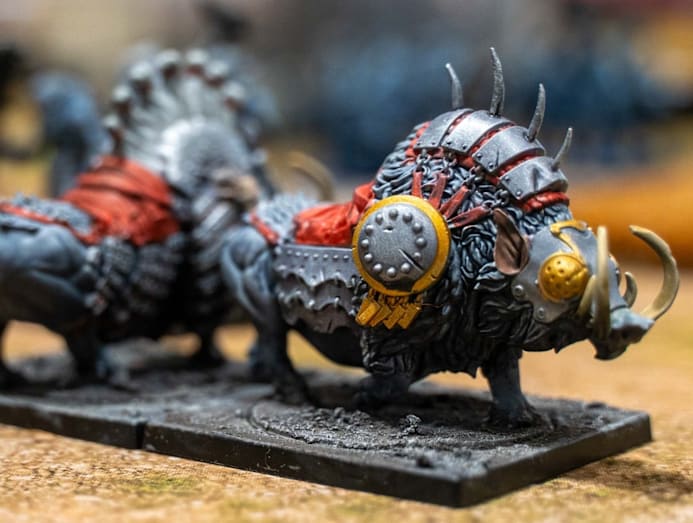
While not as popular as Warhammer 40K, Conquest by Para Bellum Games offers players an alternative choice for miniature table top gaming.
Set in a fantasy world of Ea, players can pick from 10 different factions to do battle with, from familiar-looking dwarves called Dweghom to orcs on dinosaurs called W’adrhun to weird scientist elves called the Spire.
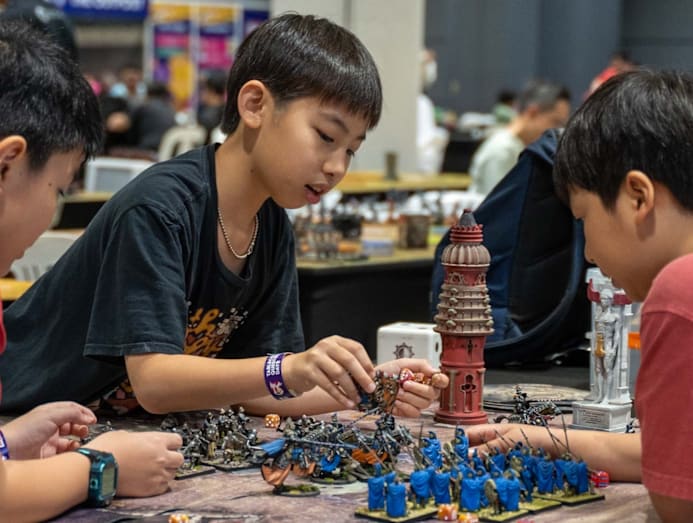
Players buy sets and paint them in their own themes, and a lot of work and effort goes into making these miniatures look and feel amazing. What sets it apart from the more popular Warhammer 40K from Games Workshop is that it has a lower barrier of entry, as a starter playing set will only set you back S$300 to S$400, compared to the S$500 to S$600 for Warhammer. And while the game has players all over the Southeast Asian region, Singapore remains the player base hub.
"In general, there are between 30 to 40 people actively playing. It's enough to support the business because again, people buy things and also, Singapore is just one country – Indonesia and the Philippines are growing markets, and Malaysia as well, to a certain extent. The main business is still located in Europe and America," said Evandra Tamzil, Rules Writer for Para Bellum Games
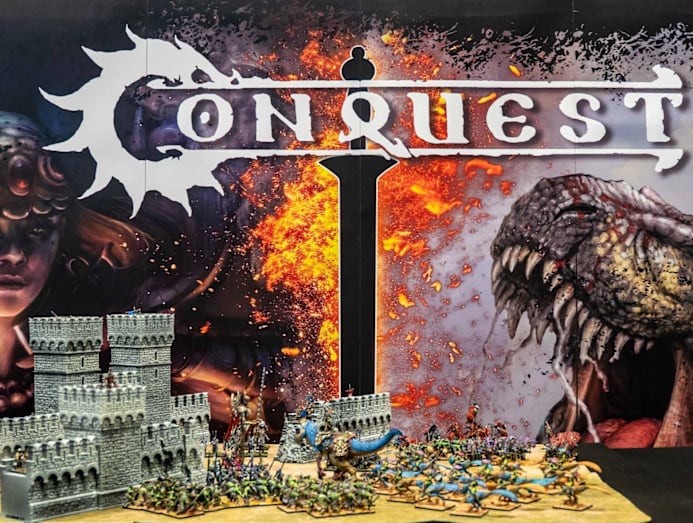
Tamzil also added that while Games Workshop dominates the market with about 50 to 60 per cent of the global market share, Para Bellum Games has "about 10 to 15 per cent”, though he admitted that the company is "not quite there yet" but that they "satisfy a certain niche for players".
"So the way that the tabletop market game functions is that there exists a certain type of niche for everyone. For example, it could be separated based on the amount of the themes that they have," said Tamzil.
"There's fantasy, which we cater to, while Warhammer 40K is about high-tech sci-fi lasers and robots. So there are a lot of different themes you can go for, and it also depends on what's your comfort level in terms of models that you play."
A PANDEMIC HOBBY
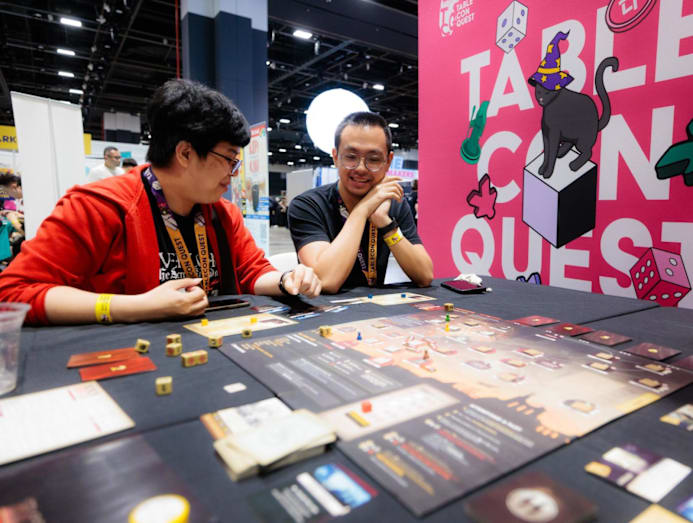
For some of these players, the global COVID-19 pandemic was a catalyst, allowing them to fully explore a hobby that they wouldn't have otherwise could, and even build a business from it.
"I think ever since COVID-19 ended, and we came out of the whole COVID shell, tabletop seems to have just blossomed," said Benjamin Leow, founder of #laiplayleow, a tabletop gaming community Singapore.
"Because I think during COVID, people realised that it's an offline interaction that they enjoy, and so they decided to carry on post-COVID."
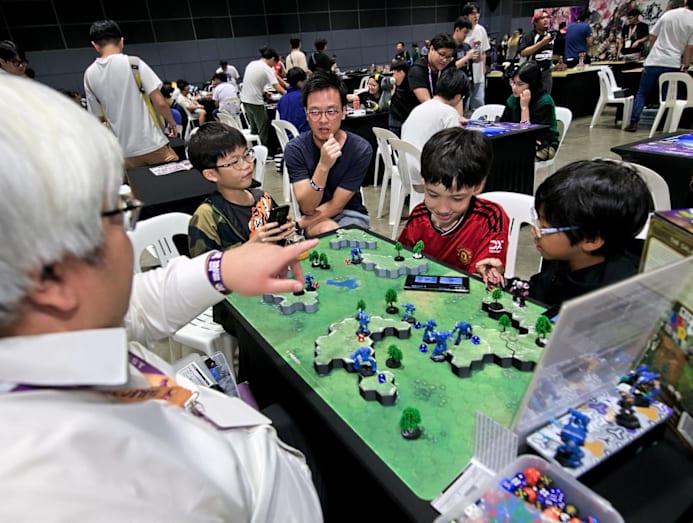
Leow's #laiplayleow started out as an interest group among friends and currently runs events for F&B establishments to promote foot traffic. It has also worked with tourism boards to promote Singapore game designers.
"We've been helping the Sabah Trade and Tourism Office in Singapore, and we even ran a convention in Sabah before, and not only did we do a convention there, we actually brought Singaporean game designers there, so we kind of elevated the Singaporean scene."




